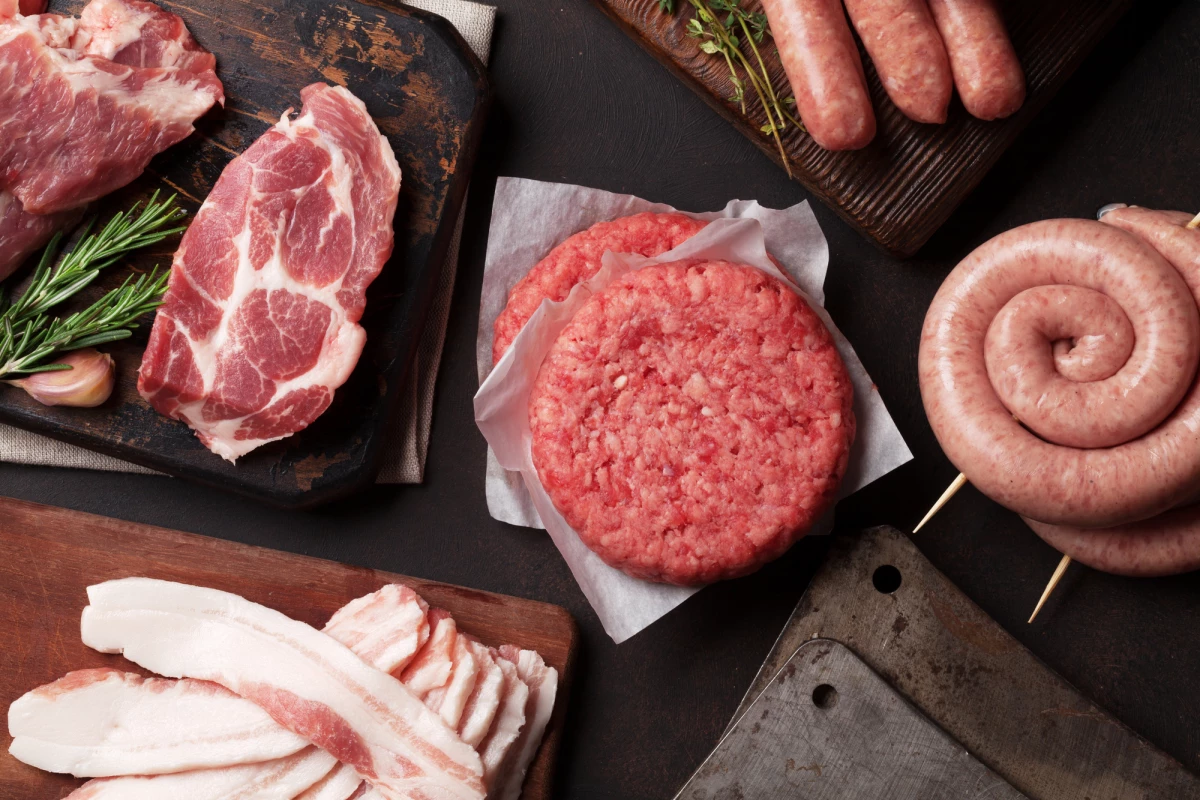Aware of the link between eating red and processed meat and the incidence of colorectal cancer but not the biological basis for it, researchers have now identified two genetic markers that may explain it. Understanding the disease process and the genes underlying it can help develop better prevention strategies.
Colorectal cancer, also known as bowel cancer, is the third most common cancer and the second leading cause of cancer-related deaths worldwide. It’s also on the rise in younger people, with the American Cancer Society (ACS) reporting that 20% of diagnoses in 2019 were in patients under 55, which is about double the rate of 1995.
Although the link between red and processed meat consumption and colorectal cancer has been known for some time, the predominant biological mechanism underpinning it has not been identified. In a new study, researchers from the Keck School of Medicine at the University of Southern California (USC) identified two genes that alter cancer risk levels based on red and processed meat consumption.
“These findings suggest that there’s a subset of the population that faces an even higher risk of colorectal cancer if they eat red or processed meat,” said Mariana Stern, the lead and corresponding author of the study. “It also allows us to get a peek at the potential mechanism behind that risk, which we can then follow up with experimental studies.”
The researchers meta-analyzed a pooled sample of 29,842 colorectal cancer cases and 39,635 controls of European ancestry from 27 studies. They first used the data from the studies to create standard measures for the consumption of red meat (beef, pork, lamb) and processed meat (bacon, sausages, luncheon/deli meats, hot dogs). For each category, they calculated servings per day, adjusted for body mass index (BMI), and divided participants into four groups based on levels of red or processed meat intake. People with the highest level of red meat consumption and processed meat consumption had a 30% and 40% increased risk for colorectal cancer, respectively. These findings didn’t account for genetic variability, which may confer a higher risk to some people.
Based on DNA samples, the researchers collected data for over seven million gene variants spanning the genome – the complete set of genetic data – for each study participant. To analyze the link between red meat intake and cancer risk, a genome-wide gene-environment interaction analysis was conducted.
Single nucleotide polymorphisms (SNPs, pronounced ‘snips’) are the most common type of genetic variation. Each SNP represents a difference in a single DNA building block or nucleotide: adenine (A), thymine (T), guanine (G), and cytosine (C). For example, a SNP may replace a C with a T in a certain stretch of DNA. Most commonly, SNPs are found in the DNA between genes. They can act as biological markers, helping locate disease-associated genes.
Here, the researchers examined participants’ SNPs to determine whether having a particular gene variant altered the risk of colorectal cancer for people who ate more red meat. The association between red meat and cancer changed for only two of the SNPs examined: a SNP in chromosome 8 near the HAS2 gene and a SNP in chromosome 18, part of the SMAD7 gene.
The HAS2 gene is part of a pathway that codes for protein modification inside cells. Previous studies have linked it to colorectal cancer but never to red meat consumption. The researchers’ analysis showed that people with a common variant of the gene found in 66% of the population had a 38% higher risk of colorectal cancer if they consumed the highest level of meat. In contrast, those with a rarer variant of the same gene had no increased cancer risk when they ate more red meat.
SMAD7 regulates hepcidin, a protein linked to iron metabolism. Food contains two types of iron: heme and non-heme iron. The body most readily absorbs heme iron, with up to 30% of it absorbed from food consumed. Because red and processed meats contain high levels of heme iron, the researchers hypothesized that different SMAD7 variants may increase cancer risk by altering how the body processes iron.
“When hepcidin is dysregulated, that can lead to increased iron absorption and even iron overload inside cells,” Stern said.
People with two copies of the most common SMAD7 gene variant present in about 74% of the population had an 18% greater risk of colorectal cancer if they ate high levels of red meat. Those with only one copy of the most common variant or two copies of a less common variant had substantially higher cancer risk: 35% and 46%, respectively.
“These findings suggest that different genetic variants may confer a differing risk of colorectal cancer in individuals who consume red meat and highlight the possible explanation for how the disease develops,” said Joel Sanchez Mendez, a study co-author.
The researchers stress that the study’s findings don’t prove a causative link between these genetic variants and red and processed meat consumption.
“This gives us some important food for thought,” said Stern. “We do these gene-environment interaction studies when we know there’s a clear association between an environmental exposure and a disease, but what happens in between is still a black box.”
The researchers hope to follow up with experimental studies that could strengthen the evidence for the role of dysregulated iron metabolism in the development of colorectal cancer.
The study was published in the journal Cancer Epidemiology, Biomarkers & Prevention.
Source: Keck School of Medicine of USC





